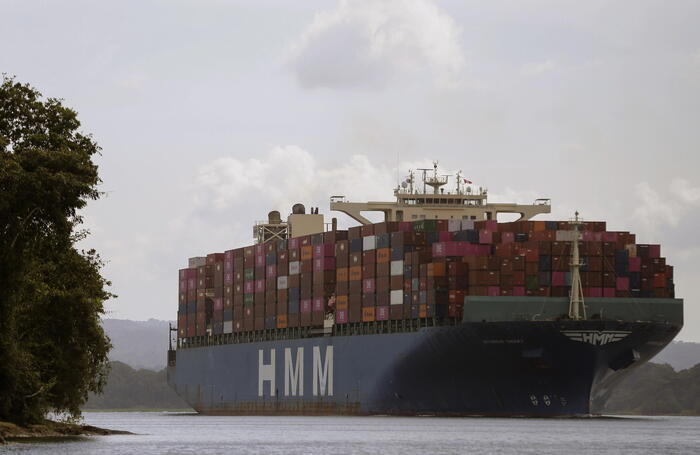Enlarge image
Syrian corona helpers working in a school
Photo: Aaref Watad / AFP
The coronavirus has been pulling its blood trail across the globe for two years now.
It has killed millions of people, brought health systems to collapse and, it is emerging, also profoundly changed the world of business.
There is much to suggest that the past twelve months will be classified as a turning point.
Like the 1972 oil crisis year or the great financial crash in 2008. The pandemic destroyed livelihoods and triggered gigantic state rescue operations, it broke trends over decades, promoted innovations and changed our consumption, our communication and our working world.
Millions of people now know what conference software is and how to scan the QR code on the vaccination certificate.
You learned about the power of biotechnology, pay in the care sector, and the vulnerability of supply chains.
Inflation seemed a distant memory of the previous century
Nothing is certain when a virus mutates.
Business models evaporate and old certainties are thrown overboard as well as economic structures that were assumed to last forever.
New questions arise everywhere:
For almost thirty years,
China
has grown at rates often of eight, nine or more than ten percent.
But that's all over now, since repeated regional shutdowns put a brake on consumption, Beijing is jeopardizing the private tech sector and a financial and real estate crisis is smoldering.
While many experts are only expecting an increase of five percent or less, Internet companies from Indonesia and Singapore are filling the gaps left by China's beleaguered digital giants.
Will the world's factory soon no longer be in the People's Republic?
Inflation
seemed a distant memory of the previous century, until the bailout programs of the central banks and global production and transport bottlenecks awakened the sleeping monster. In the USA, prices recently rose at rates of almost seven percent, and in Europe, too, the inflation rate was more than twice as high as desired. Most experts expect a decline in the next year, but hardly anyone expects inflation to fall back to its pre-crisis level. Are the monetary politicians prepared for the fact that they will now have to fight on a completely different front than before?
In the fight against the economic consequences of the pandemic, the western
industrialized countries have taken on gigantic debts
in order to bring back old times with investments in the future. US President Joe Biden wants to create American jobs for American workers with his Build-Back-Better package. The British Prime Minister Boris Johnson speaks of »Leveling Up« in order to revive the abandoned territories in the north of England. France's head of state Emmanuel Macron is planning a return campaign for the country's emigrated industry under the slogan "France Relance". Can that work, and above all: will it have to be paid if interest rates should rise soon?
For decades,
globalization
was dominated by the idea of competition. It was called "tax competition" when countries used dumping taxes to woo corporations, and the emission of greenhouse gases was seen as unfortunate collateral damage to the international division of labor. It would have continued like this if the past year hadn't brought two developments that many now regard as turning points. In Rome, industrialized and emerging countries agreed on a worldwide minimum tax for multinational companies. And at the climate conference in Glasgow, the majority of them promised to stop emitting greenhouse gases by the middle of the century. Are politicians finding a new spirit of cooperation, at least in some areas?
China blues and monetary devaluation, debt policy and tax deals: the face of the global economy has changed at a breathtaking pace in the past pandemic years.
China is dampening its growth, the specter of inflation is returning, and the Anglo-Saxon countries, for which the free market could not previously be free enough, are pursuing state industrial policies along the lines of Japan.
Government infrastructure programs worth billions have been launched there for decades to stimulate growth.
According to the London Economist, this could soon be normal in the industrialized countries of the West.
Do business with the People's Republic without alienating the United States
For the new traffic light government in Berlin, the changed environment harbors both opportunities and risks. Germany is dependent on business in China, its companies cannot withdraw there, even if the economy in the People's Republic deteriorates. But local industry could make up for the failures in China if the Washington government awards contracts for its huge infrastructure program. Doing business with the People's Republic without alienating the USA: that will be the difficult balancing act for the economic and foreign politicians of the new Berlin three-party coalition.
In the post-corona era, Germany has two advantages.
Firstly, the republic has a high proportion of industry, which must be maintained if the economy is restructured to make it climate-friendly.
If the government manages to provide enough cheap energy with a large number of new wind and solar power plants, that can be achieved.
If it fails in energy policy, Germany will fall behind.
Second, the federal government has accumulated a smaller mountain of debt than the US or France, which ensures favorable financing conditions for them if interest rates should rise soon when inflation rises.
The new government is not in a bad position, but it does have to face the country's strategic questions.
Otherwise the republic will stumble out of the pandemic just as disorderly as it got into it.







/cloudfront-eu-central-1.images.arcpublishing.com/prisa/C3LDLHDAXBBCFCHWBPELHN64FU.jpg)






/cloudfront-eu-central-1.images.arcpublishing.com/prisa/H7U7FJNUZBG6BPL5PZCMGC6EUY.jpg)